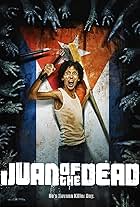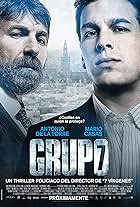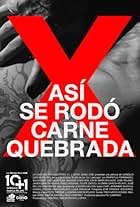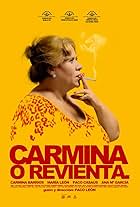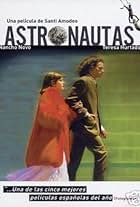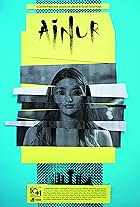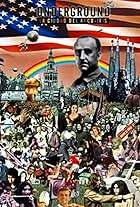Advanced search
- TITLES
- NAMES
- COLLABORATIONS
Search filters
Enter full date
to
or just enter yyyy, or yyyy-mm below
to
to
to
Exclude
Only includes titles with the selected topics
to
In minutes
to
1-47 of 47
- Based on real events, Francesc Boix is a Spaniard inmate in the Nazi concentration camp of Mauthausen in Austria who tries to save the evidences of the horrors committed inside its walls.
- A series of murders take place in 16th-century Seville, where the plague has taken hold; a condemned man faces the Inquisition as he attempts to save the son of a friend by speaking out.
- Milagros stretches a carefree youth in her last years of fertility while Jonathan seeks solace in Grindr to overcome abandonment issues. A delirious road movie, full of music, where a mysterious mermaid will set the course of the journey.
- A group of slackers face an army of zombies. The Cuban government and media claim the living dead are dissidents revolting against the government.
- A squad of four undercover cops are charged with cleaning up the streets of Seville from drugs and prostitution.
- It is summertime in a blue-collar, marginal district of a city in South of Spain. Tano.
- Three friends searching for a way out of their overwhelming loneliness and dissatisfaction set off on a journey of excessive partying.
- This is how Broken Carne was filmed is based on the making of the filming of a film, in which the story or plot of the latter is intertwined and confused with the real story that takes place in the filming itself. It has three levels of reality: it is based on the making of the filming of a film, in which the story or plot of the latter is intertwined and confused with the real story that takes place in the filming itself. It has 3 levels of reality: The film that is being filmed: Its plot is about a group of friends who meet regularly to experience new sensations with sex and relationships. These experiments or games take place in a specific landscape, which in a certain way must transcend what is done and those who do it (12 landscapes from Spain and Portugal). Each trip has a person in charge who organizes it (including some performances, poems, music, etc. to better capture the essence of the place). The team that is filming: The director, a famous underground filmmaker, wants to capture two of his obsessions in his new film: Travel as a vital, aesthetic and revealing experience. Sex as the main driver of desire and, finally, of human evolution. His assistant, a fervent admirer of his work, is in turn his lover. The filming of this film will mark a turning point in this relationship that is not going through its best moments. The producer will appear on the set from time to time showing his unique personality and his passion for cinema. THE MAKING OF itself, records everything that happens and interviews the crew and actors about their experience and sensations in Carne Quebrada, about cinema as art and about their personal feelings in real life. "THIS IS HOW BROKEN MEAT WAS ROLLED" Perpetuo: he is the DIRECTOR of the film. A man who lives more in the world of his movies and the seventh art than in real life. He is the attractive man because of his genius and creative force. Icon of "the transcendent". He is a couple of... Silvia: she is the ASSISTANT DIRECTOR. An attractive woman because of her independence, culture and beauty. Icon of the "complex woman". Diego: it's the CAMERA. Attractive man because of his imposing and silent figure. Great observer. "Temperance" icon. Javier: he is the PRODUCER. Attractive man for his rebellion, freedom and desire to enjoy life to the limit. He usually brings guests. and friends to the shoot. Icon of "the libertine and bohemian."
- A 58-year-old woman tries to make a plan to solve her financial problems after several robberies at her store, and contemplates her life.
- A man is left by his mother, wife and daughter, and he will try to found them again, not matter what.
- A woman in a Catholic brotherhood in the south of Spain tries to be president in a world traditionally reserved to men.
- Daniel is approaching forty. Laura is fifteen... almost sixteen. From what they say about him he must be a poet or a comic-strip illustrator, or both. He has just overcome a long addiction and, once back home, is trying to recongnize his life based on a strategy which consists basically in DOING EXACTLY WHAT A "NORMAL" PERSON DOES. Everything that happens to Daniel is, more or less, foreseeable because that's what it's all about: he should look after his personal grooming, take care of the small things, immerse himself in the real world... and so on until he has completed the ten small achievements in his manual, a set of COMMANDMENTS devised by an insipid public health system psychiatrist. And, in the midst of all this, an unexpected happening: Laura arrives in the city searching for her brother Andres, Daniel's neighbor. But the brother is not home and she decides to wait for him, while organizing around Daniel what could be his "perfect world".
- Manuel Franco, Manolita's father, has died. Mother and daughter decide to cook their favourite dish to celebrate it; a tasty liver steak. When the child goes to get the meat she realized that the butcher's is close. Convinced that she have to arrive home with the dinner she decided to pay the last visit to her dead father.
- A Rockumentary about the Latino International Rockstar Enrique Bunbury in his legendary 'Las Consecuencias USA Tour 2010'.
- Diana is not the only one for whom the monthly period is no fun at all. Headaches, nausea, depression -- why is it so widely accepted that women all over the world should feel so lousy on a regular basis? And why is the subject still not openly discussed? With a keen sense of perspective, humor, and self-mockery, Diana goes in search of answers. The most wide-ranging theories put forward by anthropologists, psychologists, journalists, gynecologists, and belly-dance teachers are intercut with old-fashioned information films and animated clips. The connecting factor throughout the film is 11-year-old Dominika, who keeps the audience updated about her impending menstruation, bringing up all kinds of questions. Why is blue liquid used in advertisements for sanitary napkins? Is the pill being used to adjust our body's rhythm to that of a male-dominated society? Why do we bleed when, in nature, blood is synonymous with death? Diana's quest brings her a deeper understanding and appreciation of her body. And also of her moods, because as one expert claims, whereas women are sometimes perceived to be complaining during menstruation, it is actually the hormones giving them the courage to finally say what they really always thought.
- Pedro comes back home after a hard working day. Todays is his birthday but it doesn't mean anything special to him because he's very tired and dislikes parties. Meanwhile, there are two women waiting him in different places of the town. One, Pedro's wife, is making a beautiful cake for him; the other, his lover, cooks a romantic dinner to impressed him. These two women love the same man but they don't meet each other... until now.
- De caballos y guitarras is a musical, a reflection on looking, on trying to escape an anthropocentric gaze and also on looking in the cinema. Basically, it is a horse film, about a guitar concert for horses that took place at Bramante's Tempietto in Rome, a true emblem of the ideas of window, perspective and reason, which determine a way of looking that has become hegemonic.
- Dame Veneno is a documentary directed by Pedro Barbadillo. Based on the creation of the Veneno group (formed by brothers Raimundo and Rafael Amador and Kiko Veneno). Through performances and interviews this documentary tells how they changed the world of flamenco. In it appear personages like Tomatito, Raimundo and Rafael Amador, Paco de Lucía, Ricardo Pachón and Pansequito. The documentary has music as a narrative element to approach three fundamental names of Spanish music: Camarón, Veneno and Pata Negra.



